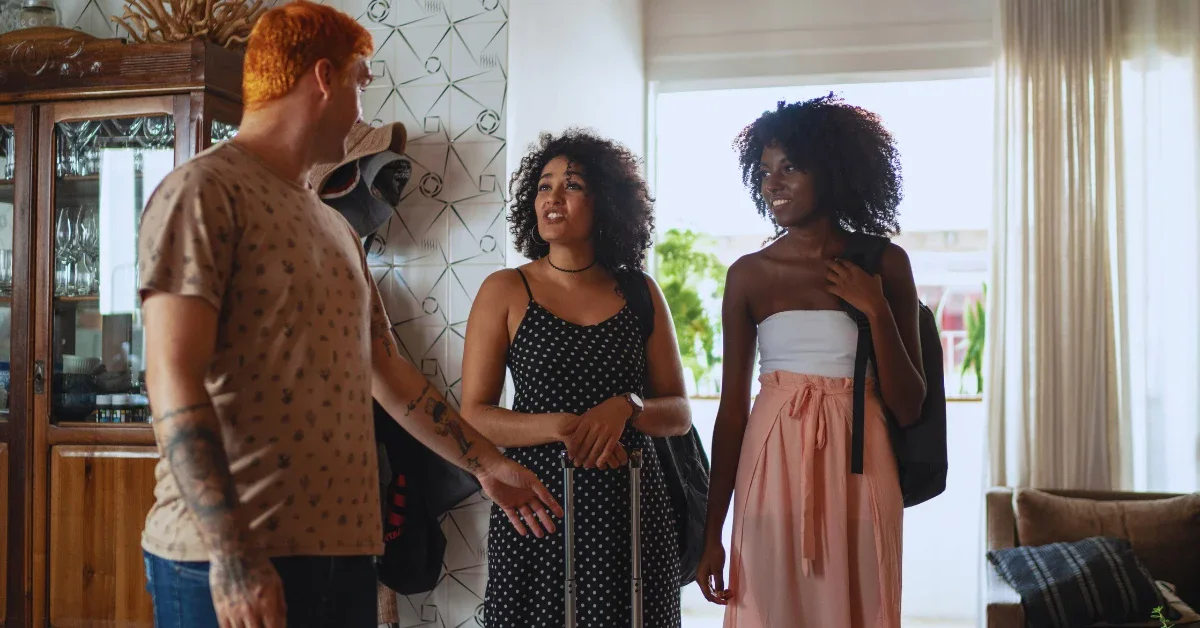Are Tenants Responsible for Their Guests? Rental Awareness
Yes, tenants are responsible for their guests according to most lease agreements and state laws. When a tenant invites a guest over, they are responsible for any damages caused by their visitors and their behaviour.
Tenants have a legal obligation to ensure that their guests do not cause any harm or damage to the property during their stay. This includes any damages to the rental unit or common areas, as well as any violation of community rules and regulations.
In most cases, landlords may hold tenants liable for damage caused by their guests. It’s essential for tenants to communicate the expectations and rules to their visitors to avoid any miscommunication and misinterpretation. Ultimately, tenants should be mindful of who they invite over as they are accountable for their actions while on the rental property.

Understanding Tenant Responsibility For Guests

Legal Definition Of Tenant Responsibility
Tenants have a legal obligation to ensure that their guests follow all the rules, policies and guidelines established by the landlord.
Tenants can be held liable for any damage their guests cause on the property, as well as legal issues that may arise.
Scope Of Tenant Responsibility For Guests
A tenant is responsible for any actions committed by a guest while they are on the property.
This includes damage to the property caused by the guest, as well as any illegal activities that the guest may engage in, such as using or selling drugs.
Types Of Guest Activities That Tenants Are Responsible For
The tenant is responsible for ensuring that their guests do not engage in any activities that violate the lease agreement.
This includes loud and disruptive behaviour, excess alcohol consumption, smoking in non-smoking areas, and violating building codes or hoa regulations.
Legal Consequences Of Tenant Negligence
If the tenant fails to act responsibly and allow their guests to act freely and engage in illegal activities, the tenant may be held accountable.
Tenants can be charged with negligence if they fail to report any illegal activity, and they could also be held liable for any damages caused by the guest.
It is essential to ensure that the guests follow the tenant’s lease rules and regulations while on the property.
Tenants have a legal obligation to ensure that their guests behave appropriately and comply with the lease agreement and building guidelines.
Failure to do so may result in serious legal and financial consequences for the tenant.
Factors Affecting Tenant Responsibility For Guests
When tenants lease a rental property, they are responsible for their guests’ actions on the premises.
However, determining the extent of that liability depends on an array of factors. Here are the key factors that can affect a tenant’s responsibility for their guests:
Nature Of The Guest’S Activity
The tenant’s liability depends on the type of activity their guest engages in.
For instance, if the guest causes damage to the property or injures someone, the tenant may be held responsible.
However, if the guest’s activity is unrelated to the tenancy, such as an accident that occurs while taking a walk outside the property, the tenant’s liability may be lessened.
Relationship Between Tenant And Guest
The tenant’s relationship with their guest affects the tenant’s responsibility for their actions.
For example, if the guest is a family member, the tenant may have a higher level of responsibility for their actions.
On the other hand, if the guest is someone the tenant met a few days prior, the tenant’s liability may be lower.
Physical Proximity Of The Tenant To The Guest’S Activity
The location where the guest’s activity occurs is significant. For example, if the tenant is in the same room as their guest, they have a responsibility to ensure their guest is not causing any harm to the property or others.
If, on the other hand, the activity takes place in a different room or in an outdoor area, the tenant may have a lower liability.
Duty Of Care And Standard Of Care
Tenants have a duty of care to their guests. If a tenant is aware that something is dangerous or could potentially cause harm, they are responsible for ensuring that their guests are aware of it.
If they fail to inform their guests, and an injury occurs as a result, they may be held liable.
Tenants are expected to maintain a reasonable standard of care to ensure their guests’ safety.
Exceptions To Tenant Responsibility
Some exceptions may limit a tenant’s responsibility for their guest’s actions.
For example, if the guest’s actions were unforeseeable, or if the tenant took reasonable measures to prevent the guest’s actions, the tenant may not be held liable.
Additionally, if the landlord has failed to maintain a safe rental property, they may share liability with the tenant.
As a tenant, you are responsible for your guests’ actions on your rental property. However, the extent of that liability depends on various factors.
Understanding these factors can help tenants to maintain a safe environment for their guests while also avoiding unnecessary legal issues.
Tips For Tenants To Manage Guest Activities

Understanding The Lease Agreement
As a tenant, it is important to understand the lease agreement, particularly regarding guests.
Make sure to read and familiarize yourself with such policies to avoid any misunderstandings.
- The lease agreement should answer important questions like the maximum number of guests, the length of their stay, and their responsibilities.
- Ask your landlord or property management to clarify any unclear provisions in the lease agreement.
Educating Guests About Their Responsibilities
As the tenant, it is your responsibility to educate your guests on the policies set by the landlord or property management.
It is crucial to ensure that your guests understand their responsibilities while staying in the leased space.
- Communicate the provisions of the lease agreement with your guests to avoid any possible violations.
- Remind your guests of their responsibilities such as not causing damage, maintaining cleanliness, and respecting the privacy of others.
- Clearly communicate the consequences of any policy violations to your guests.
Monitoring Guest Activities
Part of being a responsible tenant is monitoring the activities of your guests.
It is important to keep an eye on your guests and their actions while staying in your leased space.
- Regularly check in with your guests to ensure that they are following the policies set in the lease agreement.
- Be mindful of any unusual behaviour exhibited by your guests, and address any concerns with them as soon as possible.
- If necessary, it is also essential to report any violations to your landlord or property management immediately.
Contacting The Landlord Or Property Management For Support
If issues or concerns arise with guests, it is necessary to seek the support of your landlord or property management.
They can provide valuable advice or assistance in dealing with complex guest situations.
- Inform your landlord or property management immediately if problems with guests arise.
- Seek guidance from your landlord or property management if you need assistance in dealing with difficult guest situations.
- Always prioritize communication and transparency with your landlord or property management to ensure that issues are resolved promptly.
Seeking Legal Advice In Case Of Complex Situations
In the event of complex situations with guests, it may be necessary to seek legal advice.
- Consult with a lawyer for legal advice on tenant rights and responsibilities.
- Hire a lawyer to help with eviction proceedings if necessary.
- Always prioritize compliance with local, state, and federal laws.
Frequently Asked Questions For Are Tenants Responsible For Their Guests
What Is The Tenant’S Responsibility For Their Guests?
Tenants are responsible for their guests’ behaviour while on the property. If their guests damage the property or violate the terms of the lease, tenants will be held liable.
Can A Landlord Hold A Tenant Accountable For Their Guests’ Actions?
Yes, if a guest causes damage to the property or violates the lease, the landlord can hold the tenant responsible. It is the tenant’s responsibility to ensure their guests comply with the lease terms.
Does A Tenant Need Permission To Have Guests?
Most lease agreements require tenants to notify the landlord of all guests staying for an extended period. However, short-term visits by guests are typically allowed without permission.
When Can A Landlord Evict A Tenant And Their Guests?
A landlord can evict a tenant and their guests if the guests cause damage to the property or violate the lease terms. The eviction process typically requires a notice period.
Conclusion
After carefully examining the responsibilities of tenants regarding their guests, we can conclude that tenants do bear some responsibility for their visitors.
While landlords typically hold tenants accountable for any damage or disturbances caused by their guests, it’s essential for tenants to communicate and set clear expectations with their visitors upfront.
It’s also important to understand that tenants remain responsible for their rental space even when it’s occupied by guests, making it crucial for them to ensure their visitors follow all rules and regulations.
Failure to do so can result in costly consequences for the tenant and, in some cases, even eviction.
Therefore, tenants must be proactive in managing their visitors’ behaviour and taking quick action if things go awry.
Overall, being mindful and responsible when having guests over can help ensure a positive rental experience for everyone involved.